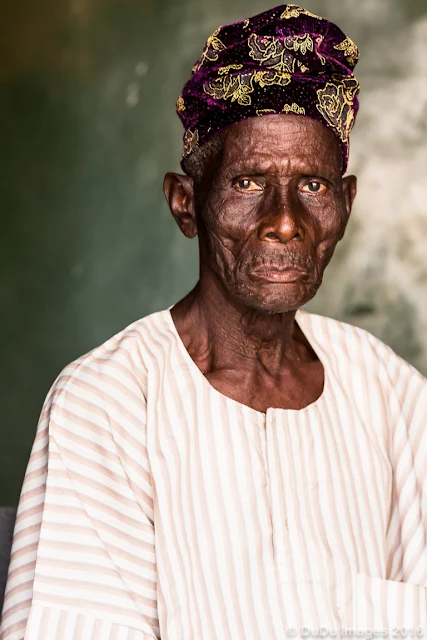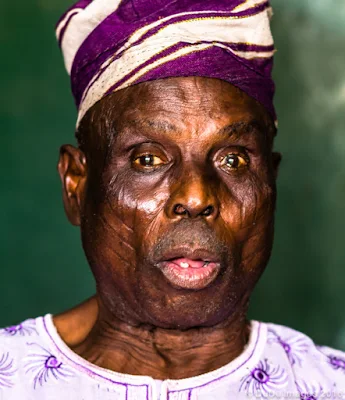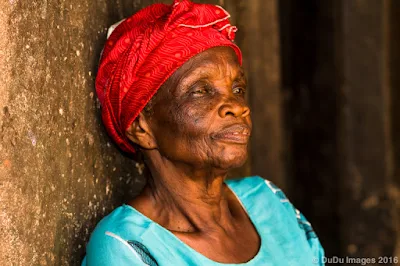I was birthed in Ibadan, in the great city where the footprints of my life journey stay imprinted, in the great city where the home of the great Ogunmola, my great great great grandfather lies amidst the other infamous brown roofed houses of Ibadan.
In January 2016, I visited the Ogunmola Square and though it was my first visit to the Compound, the connection to my relatives felt like a lost and found piece of a jigsaw puzzle to my life. These were my people, who without reservations took me on a journey, through their insight and life experiences, both to the past and the present.
Ogunmola, as I was told by the Agba [The Head Of Ogunmola House] of the compound was an Ifa priest born in Iwo Ni Fesu. He came to Ibadan during the Ijaiye war involving Oluyole, where he agreed to fight for the Oluyole King. His fighting skills during the war were quickly recognised by other fighters, tagging him as the ‘Ope Ijaiye ko le royin Ogunmola-(The palm tree located at Ijaiye has not grown since the war due to his fighting skills). Upon his return from the Ijaiye war, he was bestowed the title of the ‘Bashorun Ogunmola’ of Mapo area, Ibadan.
He died of small pox in 1867, leaving three children, Osun, Ilori and my great great- grandmother, Obasa.
Though centuries have passed, Ogunmola remains in our minds, even if only when we recite the oriki of Ibadan.
‘Ibadan mesi ogo, Nile Oluyole’
‘Ilu Ogunmola, olodogbo keri loju ogun’
I also spoke to other relatives in the Compound, most of whom were the elderly I captured images of. The grey in their cataracts pierced the humanity of my soul as they all shared their experiences. Their stories were captivating, different but noticeably similar in their conclusions, the theme of which was poverty which they managed by relying on hand-outs from families, any individual kind enough to spare some change from their pockets and ‘Agbo’, cheap local herbs, for their poor health
When I looked at their hands, it had beautiful strokes which to me told stories of their past and present. They are hands which have toiled the earth, hands which have contributed to the success of some generations, hands which should now be catered for.
Their faces only told me one thing that this is the forgotten generation.
We say ‘Black don’t crack’, but to whom do we refer? Because the blacks in these images have cracked, cracked from being forgotten; cracked like the walls of their decayed houses.
Culled on request from duduimages.wordpress.com






Old age is a gift
ReplyDeleteBeautiful piece! Black does crack from wear and tear and years of neglect.
ReplyDeleteWe need better reforms to cater for our elderly. Their children too should strive to care for them.
When you are old you become like a baby and need to be taken care of like one.
Some one should please explain
ReplyDeleteSweety you're dumb
DeleteWhatever.
ReplyDeleteAwww, this is really sad.
ReplyDeleteMost of them are just abandoned. I always wonder where their children are. Didn't they have any? Or they just don't care?
God help me take care of my parents, heaven know they deserve every piece of happiness.
This one na Yoruba headache. Igbos don't abandon the elderly. Ask Charles Oputa - Charly boy.
DeleteMy dear, most times I get so emotional when I see old women in d market still struggling to earn something to eat
DeleteAnytime they sit beside me in a buss I just pay for them
I could imagine my mum still struggling to eat, God forbid @ her old age
@ anonymous... You forgot to add that ONLY IGBOS MAKE IT TO HEAVEN. Frustrated ewu
DeleteOk
ReplyDeleteThis is a very deep Yoruba history. I enjoyed reading it anyway.
ReplyDeleteWow. This is hauntingly beautiful. Great Ibadan.
ReplyDeleteYea u captured it!
DeleteHauntingly beautiful.
Wow. This is beautiful. Great Ibadan
ReplyDeleteWow. This is beautiful. Great Ibadan
ReplyDeleteWow. This is beautiful. Great Ibadan
ReplyDeleteWow. This is beautiful. Great Ibadan
ReplyDeleteWow. This is beautiful. Great Ibadan
ReplyDeleteWow. This is beautiful. Great Ibadan
ReplyDeletelol at cracked.
ReplyDeleteMy dear these old people are still better, cracked or not. My grandma is 90yrs old, still agile, very alert and ran her shop up until 2yrs ago that she fell and hit her head and her kids said enuf is enuf. She has properties she still goes to visit the tenants. She doesn't even have a maid,becos most of them don't stay. Just an aunt that lives with her and does the cleaning and going to market. My grandma still cooks. She even still offers me money which I refuse bcos she still sees me as a baby, calls us grandkids on our bdays etc.
ReplyDeleteMy epistle is our old most times are still very strong. An average oyinbo by 80yrs they are living in old peoples home, being worn pampers, they use walking stick, they bathe them, feed them etc. An average 80yr old in d village is sometimes still farming and going to market. They may have occasional mistake of soiling themselves, but they aint wearing pampers and no one is bathing and feeding them.
So my dear we may sometimes crack, but we are still strong and agile than the average white man.
Good to be old and looking young
ReplyDelete@ nwa amaka and faith Martins I am with you on this. Someone should explain. And no I am not olodo and I read it. It just didn't sink into my medulla oblongata
ReplyDeleteThere should be a welfare system that cater for old people.
DeleteThanks Olori
DeleteIbadan mesi ogo..nibi ole ti n jare olohun..hahhahha*i love that part*
ReplyDeleteThis is deep
ReplyDeleteNice piece
ReplyDeleteIt is well with them. I took care of my parents and by God's grace my children will take care of me.
ReplyDeleteWow...beautiful story of our past.How will our generation be like?How will out hands look like when we get to this age (golden? What will generations before us say about ours?God bless our past (aged ones) ,we pray we will be able to make such impressions on our future (children ).
ReplyDeleteLol. Stella, get ready to see enough 'please explain' or 'can't read this rubbish' under this post today.
ReplyDeleteThis is why they have old people's homes in developed countries, so these people can be taken care of. You may say their children should cater for them but first we should ask where their children are. Do you know what their own situations are like? When you see things like this you know Africa still has a long way to go.
my only surviving gran lives in the village but her children have built a house for her and she's a landlady collecting rents. She never lacks food or good health care. Because when she feels somehow she will call and someone must go and bring her to the City for medical treatment. She even flashes me sometimes and I send her credit aftwr I call back. Once she's done she prefers to go back to supervsing her farm than sit idle in lagos or anywhere else. This is only possible because her children and grand children are comfortable. But when she tells me old tales, it can drop my mood for a whole day. Old people have really seen things.
You are right on point and the only one that made meaning contribution here but this your id na real taaaaa and Hian.
DeleteWhile there are other factors leading to the neglect of the elderly ones, I would like to point out how our "churches" are core factors in this decay.
ReplyDeleteChurches that preach that the elderly ones are witches, the villagers are evil, your town is cursed...blah blah blah have done nothing but incur curses on their members.
The bible says "Honor thy father and mother, so your days may be long". Wonder why people are dying young(asides health factors and other obvious factors)?
I am not saying there are no "evil ones" but I wonder why I would give them so much priority when I am safely "hidden" in Christ.
My grandma is 90 and still strong, travels up and down like no man can tie her down. I have plans to give her a "transportation by air experience" this year by God's grace if only to repay her for prayers for me everyday.
Pray we all age with grace with loving families to care for us. Ibadan my beloved birth place, how i miss you!
ReplyDelete